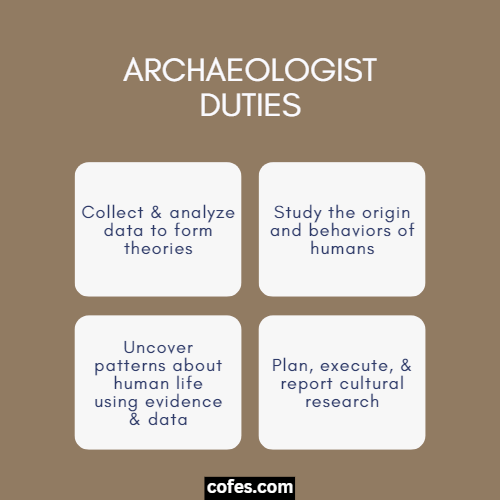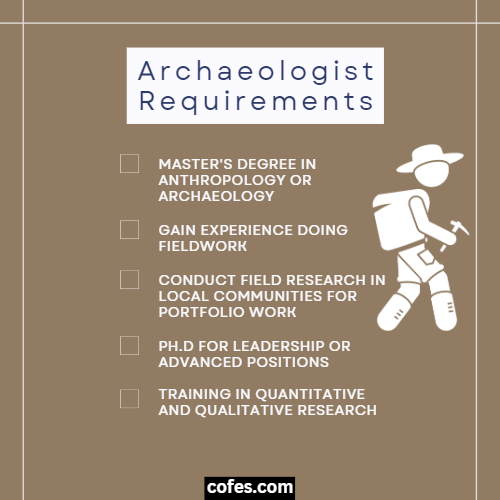Archaeology can be a fascinating career path, although not quite as adventurous as the movies make it seem.
Archaeology is a satisfying career for curious people who crave discovery.
Being the first person in hundreds to thousands of years to see a building or object from the past is exciting!
As an Archaeologist, you also get to travel to different places around the globe and write about your findings.
Despite the sometimes harsh working conditions, most Archaeologists are extremely happy with their careers.
Archaeologist Job Information
| Official Job Title | Archaeologist |
| Average Salary | $60,462 |
| Stress Level | Below Average |
| Work/Life | Below Average |
| Job Satisfaction | Above Average |
| Career Advancement | Average |
Archaeologist Job Description
What Is An Archaeologist?
Archaeology in the Americas is a sub-field of Anthropology that studies humans.
An archaeologist collects historical data via the artifacts, buildings, writings, and other evidence left behind by previous generations, civilizations, and cultures.
Then, you work with a team, asking questions and developing educated theories on your findings and how it all contributes to the development of the human species over time.
Some Archaeologists specialize in specific subjects.
For example, a Bioarchaeology specialization is studying human remains, and a Lithics specialization is the study of stone tools.
What Does An Archaeologist Do On A Daily Basis?
Whether you work for a university, government, or museum, an Archaeologist’s main focus is collecting and analyzing data to formulate theories and develop informed assumptions.
Your work typically involves several weeks of fieldwork per year to excavate historic sites, collect and manage an inventory of artifacts, analyze the information you have gathered, report your research, and curate collections.
Fieldwork often involves traveling to remote areas where the weather can be a factor in determining your working hours on a particular day, as it is usually done outdoors.
The majority of archaeologists today work in cultural resource management, or CRM. CRM companies are responsible for the archaeological research done to follow federal historic preservation laws.

Responsibilities, Duties & Roles Of An Archaeologist
Your responsibilities as an Archaeologist include excavating historical sites, recovering data and objects such as tools or pottery, and analyzing your findings with a team.
You must also be familiar with specialized tools, such as the trowel, which is used to scrape away thin layers of soil, and is considered an essential tool for an Archaeologist in the field.
Archaeologist Salary
Average Salary
The average annual salary for this job is $60,462, depending on specializations and the type of industry you work for, making this average lower or higher.
Starting Salary
The starting annual salary for Archaeologists is $34,500 per year.
Senior Salary
According to several sites, the average annual salary of a Senior Level Archaeologist is $79,503 per year.
How To Become An Archaeologist
The Entry Level: Certification, Training & Degree
Most aspiring Archaeologists major in Anthropology or Archaeology and continue to graduate school to earn a master’s degree or doctorate in archaeology.
A doctorate is necessary if your dream Archaeology role includes teaching at a university or requires advanced technical or leadership skills.
Getting a job with just a bachelor’s degree in archaeology is possible.
You can work as a field or laboratory technician or research assistant if you have work experience through an internship.
Other Skill Sets, Requirements & Qualifications
Studying foreign languages can be helpful and is considered a valuable asset in this field.
Archaeology has a limited number of job openings and is, therefore, highly competitive.
Archaeology students should pursue internships during their education to increase their job prospects.
How Long Does It Take To Become A Archaeologist?
Since the requirements include extensive education and field experience, it typically takes about six years to become an Archaeologist and seven to nine additional years if you wish to earn a doctorate.

Is It Hard To Become A Archaeologist?
It is somewhat difficult to become an Archaeologist if only due to the extensive education.
However, as long as you actively participate in internships and volunteer for fieldwork during school, the highly competitive jobs in museums and universities are more likely to hire you.
Archaeologist Career Paths
The Archaeologist Roadmap
Your experiences as an Archaeologist can prepare you to transition into related roles, such as an Associate or Team Manager.
Advancements in this field depend primarily on the research journals an archaeologist publishes.
Projections For Growth In Archaeologist Jobs
Archaeologist employment opportunities are expected to grow by 6% through 2031, as fast as the average.
The job outlook for archaeologists is always partially dependent on allocating research funds to public institutions by federal and state governments.
In Summary: Is Archaeologist A Good Career?
Archaeologists travel to exciting places to look for information, make discoveries, and theorize about their findings.
It’s no wonder Archaeologists tend to be happy with their jobs.
Working Conditions
Can An Archaeologist Work Remotely From Home?
Some archaeologist job listings include an option to work from a home office, with some fieldwork and travel possibly still required.
How Many Hours Does A Archaeologist Work?
You are confined to regular business hours, but this becomes less likely when an archaeologist works in the field.
Fieldwork can involve weekends, early mornings, late evenings, and holidays.
Can A Archaeologist Work Part-Time?
It appears that around 51% of archaeologists work in full-time roles, while 49% work part-time.
What Are The Average Vacation Days Of A Archaeologist?
The number of vacation days for an Archaeologist depends on the company in which you get hired.
Most companies offer five paid vacation days to start, with the ability to accrue more the longer you remain employed.
Alternative Careers & Similar Jobs to an Archaeologist
- Marine Biologist
- Zoologist
- Food Scientist
- Veterinary Assistant
- Research Assistant
- Forensic Science Technician
- Natural Sciences Manager
- Neuroscientist
- Dietitian
- Radiologic Technologist
- Meteorologist
Archaeologist Resume Tips
It is important to be an active listener and proficient at public speaking, writing, and giving presentations to demonstrate your ability to share your future findings.
If you know several languages, highlight them in your resume.
Communicate your experience with solving problems and making decisions.
Archaeologist Interview Questions
Q1: What are your qualifications?
Why it works: Asking this question gives the applicant a chance to share their training and experience in the field they are applying for.
Q2: Give an example of how you handled a situation where someone disagreed.
Why it works: This question is excellent because Archaeologists sometimes must make difficult decisions in a team setting, and the employer needs to know if they can deal with disagreement.
Q3: What are your thoughts on the field of archaeology?
Why it works: This question works because you present an opportunity for the applicant to share why they are passionate about the field and gives the employer a summarized perspective of the applicant.
Jobs Related To Archaeology
- Museum Curator
- Historian
- Geographer
- Environmental Scientists and Specialists
- Geologist
- Psychologists
- Sociologists
For HR Managers: Tips For Hiring An Archaeologist
Key Characteristics To Look For In An Archaeologist
Archaeology candidates should demonstrate that they are able to work well in groups since Archaeology is a collaborative job.
You should also look for someone who is detail-oriented and analytical.
Ideal applicants will have completed their education with several years of experience in the field.
Minimum Level Of Education & Experience
The minimum level of education for Archaeologists is a Bachelor’s degree in anthropology or archaeology, though most archaeologists complete a master’s degree to increase their prospects.
References
- “Anthropologists and Archeologists: Occupational Outlook Handbook: : U.S. Bureau of Labor Statistics.” Bls.gov, 8 Sept. 2021, www.bls.gov/ooh/life-physical-and-social-science/anthropologists-and-archeologists.htm#tab-1. Accessed 11 Oct. 2021.
- “Archaeology as a Career.” Society for American Archaeology, 2021, www.saa.org/about-archaeology/archaeology-as-a-career. Accessed 11 Oct. 2021.
- CareerExplorer. “Archaeologist Demographics in the United States.” Careerexplorer.com, CareerExplorer, 17 Jan. 2018, www.careerexplorer.com/careers/archaeologist/demographics/. Accessed 25 Oct. 2021.
- —. “What Does an Archaeologist Do?” Careerexplorer.com, CareerExplorer, 17 Jan. 2018, www.careerexplorer.com/careers/archaeologist/. Accessed 10 Oct. 2021.
- “Environmental Science.” Environmentalscience.org, 2017, www.environmentalscience.org/career/archaeologist. Accessed 10 Oct. 2021.
- “How to Become an Archaeologist: Complete Career Path.” Glassdoor.com, 2021, www.glassdoor.com/Career/how-to-become-archaeologist_KO14,27.htm. Accessed 25 Oct. 2021.
- “How to Become an Archaeologist: Education & Career Requirements.” Best Accredited Colleges, Best Accredited Colleges, 6 May 2011, bestaccreditedcolleges.org/articles/archaeologist-educational-requirements-for-a-career-in-archaeology.html. Accessed 25 Oct. 2021.
- https://www.facebook.com/thebalancecom. “Archaeologist Job Description: Salary, Skills, & More.” The Balance Careers, 2019, www.thebalancecareers.com/archaeologist-525984. Accessed 10 Oct. 2021.
- U.S. News Best Jobs. “Archaeologist Ranks among Best Jobs of 2021.” Usnews.com, 2019, money.usnews.com/careers/best-jobs/archaeologist. Accessed 10 Oct. 2021.
- “What Does an Archaeologist Do? Role & Responsibilities.” Glassdoor.com, 2021, www.glassdoor.com/Career/archaeologist-career_KO0,13.htm. Accessed 17 Oct. 2021.
- “What Is Archaeology?” Society for American Archaeology, 2021, www.saa.org/about-archaeology/what-is-archaeology. Accessed 10 Oct. 2021.
